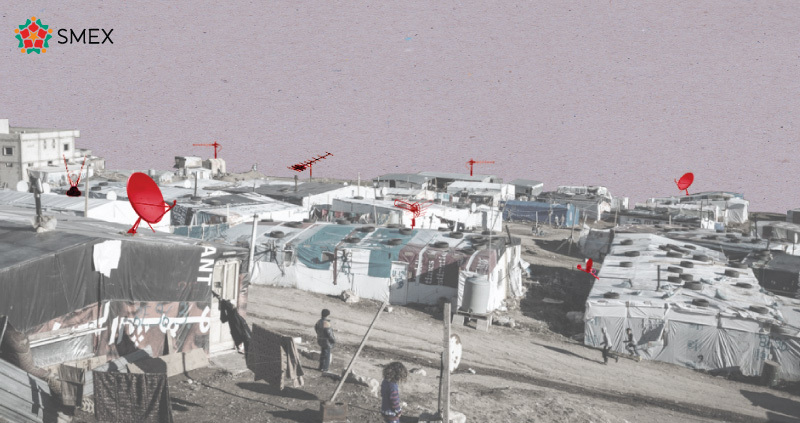Security forces raided the tents of Syrian refugees in several towns in the Beqaa Valley, Lebanon, between October 10 and 14, confiscating radios, televisions, mobile phones, internet routers, and satellite dishes and practically cutting off the camps from their surroundings and the world at large, according to what a camp resident told SMEX.
“I own a small, old TV which I keep hidden in case they suddenly show up and take it,” Abu Abdo, a refugee living in one of the camps in West Beqaa, told SMEX. The camp’s name is purposefully concealed to protect Abu Abdo. “They came and ravaged and destroyed everything.”
It is not clear why telecom devices have been confiscated from refugee camps that already lack the minimum requirements for a dignified life.
In a Whatsapp voice-message obtained by SMEX, a man can be heard aggressively threatening camp residents: “This is your last warning! From the shawish [i.e. camp chief] to the rest of you.” The man warned them that they are not allowed to have Internet routers, whether new or old.
The voice-message was sent to a Whatsapp group of residents in the camp where Abu Abdo lives, along with the phrase: “Order from the Army Intelligence,” but we have not been able to verify the validity of the voice-message or the identity of its sender.
A source from a security agency contacted by SMEX denied that any of these events had ever occurred, stressing that “security forces carry out such operations only if there are criminals or fugitives hiding in the camps.”
A Syrian activist who wished to remain anonymous to protect his personal security told SMEX that these practices began nearly four months ago in camps located in West Bekaa, Zahle and Bar Elias. He said that around 13 raids have taken place so far, the most recent of which occurred last week in the camps of Al-Yasamin, Al-Abrar, and 052.
The activist added that “security forces confiscated and destroyed anything that can be used as a means of communication with the outside world beyond the camp, in addition to destroying solar panels and violently beating refugees.”
“Other camps face the same risks,” he added. “Camp officials gathered last week and delivered new warnings to camp residents, urging them not to have any internet routers.”
Mohamad Najem, executive director at SMEX, affirmed that “Access to telecom, communication and information-sharing networks is a human right that cannot be denied to anyone. Lebanon is a signatory of the Universal Declaration of Human Rights, of which Article 19 clearly and explicitly enshrines the freedom of opinion and expression.”
This is not the first time such violations of refugee rights have been committed since they first arrived in Lebanon, shortly after the eruption of the war in Syria. On March 23, 2021, Amnesty International published a report in which it revealed a series of violations against Syrian detainees, such as unfair trials and different forms of torture, including beatings with metal bars, electric cables and plastic hose pipes. Amnesty mainly accused the LAF Intelligence of committing these violations.
Illegal and Inhumane Practices
Attorney and legal expert Najah Itani told SMEX that, “These types of raids cannot be carried out without an order issued by the Public Prosecution or a competent judge,” even if they are for security purposes. Since the security forces that undertook this “mission” did not have any such order, the operations they launched four months ago, which are still ongoing, “have no legal justification.”
Itani added that by carrying out these raids, security forces are committing another violation of the law, which is the confiscation of private properties without returning them to their owners after the end of the investigation, in addition to breaking and destroying them. “The Universal Declaration of Human Rights guarantees access to the Internet and considers it to be a fundamental human right. Therefore, these acts are a gross violation of an international instrument ratified by Lebanon,” the attoreny emphasized.
Although Lebanon has not signed the 1959 Refugee Convention—the most important international agreement on dealing with refugees—it has signed several international treaties that oblige the country to offer support and protection to refugees. For example, Lebanon has signed the Universal Declaration of Human Rights (Articles 22 and 23), the International Convention on the Elimination of All Forms of Racial Discrimination (Article 5), the International Covenant on Civil and Political Rights (Article 20), and the Convention against Torture and Other Cruel, Inhuman or Degrading Treatment or Punishment (Article 3). This makes Lebanon answerable to the international community, where it is required to refrain from any practices that would violate these conventions. However, the reality is quite different.
The main problem lies in the lack of a clear law that governs the relationship between refugees and the state. According to Itani, “Refugees in Lebanon are not classified as such under Lebanese law. They are treated as foreign nationals so the country can avoid the legal commitments that it would have to undertake towards these individuals if it were to sign the Refugee Convention.”
Security forces should put an immediate end to these practices and open an in-depth investigation to identify the parties responsible for this unjustified violence. This is crucial considering recent developments that foreshadow a new wave of flagrant human rights violations amid a total lack of legal teams to avoid this aggravating chaos.



